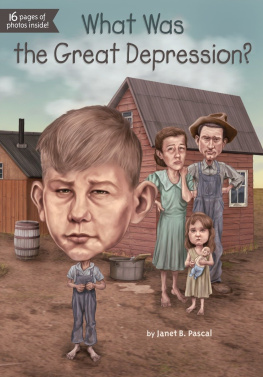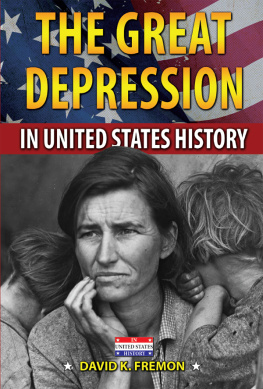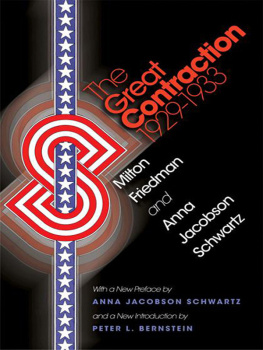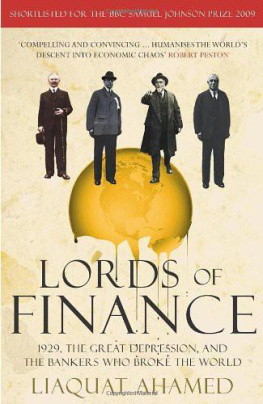McElvaine - The Great Depression: America, 1929-1941
Here you can read online McElvaine - The Great Depression: America, 1929-1941 full text of the book (entire story) in english for free. Download pdf and epub, get meaning, cover and reviews about this ebook. City: New York;United States, year: 1993;2009, publisher: Times Books;Three Rivers Press, genre: Politics. Description of the work, (preface) as well as reviews are available. Best literature library LitArk.com created for fans of good reading and offers a wide selection of genres:
Romance novel
Science fiction
Adventure
Detective
Science
History
Home and family
Prose
Art
Politics
Computer
Non-fiction
Religion
Business
Children
Humor
Choose a favorite category and find really read worthwhile books. Enjoy immersion in the world of imagination, feel the emotions of the characters or learn something new for yourself, make an fascinating discovery.

The Great Depression: America, 1929-1941: summary, description and annotation
We offer to read an annotation, description, summary or preface (depends on what the author of the book "The Great Depression: America, 1929-1941" wrote himself). If you haven't found the necessary information about the book — write in the comments, we will try to find it.
McElvaine: author's other books
Who wrote The Great Depression: America, 1929-1941? Find out the surname, the name of the author of the book and a list of all author's works by series.
The Great Depression: America, 1929-1941 — read online for free the complete book (whole text) full work
Below is the text of the book, divided by pages. System saving the place of the last page read, allows you to conveniently read the book "The Great Depression: America, 1929-1941" online for free, without having to search again every time where you left off. Put a bookmark, and you can go to the page where you finished reading at any time.
Font size:
Interval:
Bookmark:
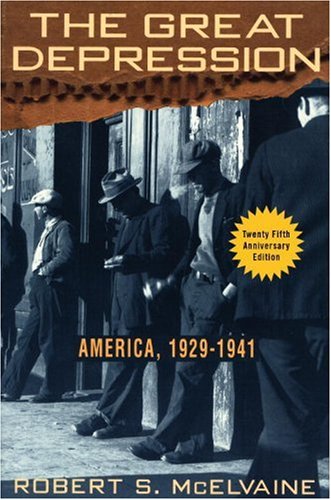
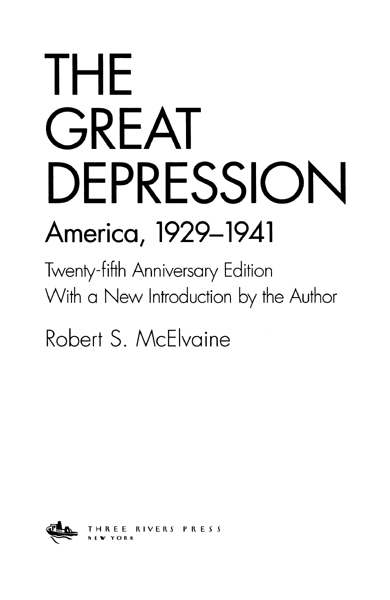
FOR ANNE,
FOREVER
Copyright 1984, 1993, 2009 by Robert S. McElvaine
All rights reserved.
Published in the United States by Three Rivers Press, an imprint of the Crown Publishing Group, a division of Random House, Inc., New York. www.crownpublishing.com
Originally published in hardcover in the United States by Times Books, an imprint of the Crown Publishing Group, a division of Random House, Inc., New York, in 1984.
Portions of Pretty Boy Floyd by Woody Guthrie, Copyright 1961 by Fall River Music, Inc. All rights reserved. Used by permission.
Library of Congress Cataloging-in-Publication Data
McElvaine, Robert S., 1947
The great depression
1. United StatesHistory1993-1945. 2. United StatesHistory
1919-1933. 3. United StatesSocial conditions1933-1945.
4. DepressionsUnited States1929. 5. United StatesEconomic
conditions1918-1945. 6. New Deal, 1933-1939. I. Title.
E806.M43 1983
973.916 82-40469
eISBN: 978-0-307-77444-6
v3.1
Praise for Robert S. McElvaines The Great Depression
Fair-minded, incisive, thoroughly informed, and eminently readable, The Great Depression is a fine account of the ordeal of the 1930sone that does justice to the social and cultural dimensions of economic crisis as well as to its political and economic impact.
Arthur Schlesinger, Jr.
McElvaines reflections on the Great Depression re-create one of the most dramatic and traumatic times in the history of our country. With our sense of the past imperiled, this is essential reading.
Studs Terkel
McElvaine is thorough as well as entertaining. Along with cultural aspects, which McElvaine handles superbly, he astutely reports the political unrest.
Cleveland Plain Dealer
Several factors distinguish McElvaines treatment of the period from the numerous studies that have appeared before. The result is an account that never misses a beat a book that should be consulted for years to come.
Philadelphia Inquirer
One of the best books anybody has attempted on this amazing era. McElvaine is an uncommonly talented writer who knows how to clarify the mysteries of a complex subject. He does it with a disarming lack of academic ponderousness.
Sacramento Bee
This book is a path-breaking one that charts the impact of the economic crisis not only on the day-to-day lives of ordinary Americans, but also on their values and most-deeply cherished beliefs.
Anthony J. Badger, Cambridge University, author of FDR: The First Hundred Days
McElvaines book celebrates the power of people to direct economic and political change.
Newsday
McElvaines passion enhances his work. You can disagree with an engaged writer but you cannot ignore him.
Baltimore Sun
Also by Robert S. McElvaine
Down and Out in the Great Depression:
Letters from the Forgotten Man (editor)
The End of the Conservative Era:
Liberalism After Reagan
Mario Cuomo: A Biography
Whats Left:
A New Democratic Vision for America
The Depression and the New Deal:
A History in Documents (editor)
Eves Seed: Biology, the Sexes,
and the Course of History
Encyclopedia of the Great Depression
(editor-in-chief)
Franklin Delano Roosevelt
Grand Theft Jesus:
The Hijacking of Religion in America
T his book would not have been possible without the generous assistance over a period of years of numerous individuals and institutions. They cannot all be named here, but I want to express special thanks to some of them. The support of the National Endowment for the Humanities, in the form of a summer seminar in 1978, a summer stipend in 1979, and a yearlong seminar in 198081, was essential to the completion of my research. A fellowship from the Eleanor Roosevelt Institute in 1975 allowed me to conduct much of the early research for the book. A Millsaps College Faculty Fellowship enabled me to devote the summer of 1982 to finishing the manuscript.
My exploration of the Great Depression began with my dissertation at the State University of New York at Binghamton. I owe a great debt to my advisers on that project, Charles Forcey, Richard Dalfiume, and Melvyn Dubofsky. My greatest intellectual obligation is to Professor Lawrence W. Levine of the University of California, Berkeley, in whose NEH summer seminar, The Folk in American History, my work was redirected toward the form in which it now appears. Larry Levine inspired me to become excited again about the topic; he is a model of scholarship and friendship.
Joan W. Scott of the Institute for Advanced Study, who led a yearlong NEH seminar, The New Labor History, in which I participated, guided me in many ways to become a better historian. The criticism of other members of the seminars at both Berkeley and Brown was invaluable. James T. Patterson was also particularly helpful to me during my year at Brown University. Discussions I had with E. P. Thompson, who was then a visiting professor at Brown, helped to shape in my mind the key concept of a popular view of economics based on morality. Professor Mark Estrin of Rhode Island College was of much assistance in expanding my understanding of the Depression-era cinema.
In addition to these scholars, the following people have read and criticized all or part of this book, although in some cases in rather different earlier drafts. I want to thank each of them, although I hasten to add that I did not always follow their suggestions and they should not be blamed for anything that remains in the book: Edward Akin of Mississippi College; David Bennetts of St. Johns College; David Brody of the University of California, Davis; Jane Clary of Millsaps College; Len De Caux of Glendale, California; Otis Graham of the University of North Carolina, Chapel Hill; Naomi Lamoreaux of Brown University; Staughton Lynd of Youngstown, Ohio; Paul Murray of Siena College; Joyce Peterson of Florida International University; Phillip Scranton of Philadelphia College of Textiles and Science; Mary H. Stevenson of the University of Massachusetts, Boston; and James Weinstein of Chicago.
My colleagues in the Millsaps College history departmentRoss Moore, Frank Laney, Charles Sallis, Ann Sumner Holmes, and Adrienne Phillipshave over the years been consistently helpful. I thank all of them.
I presented some of the ideas contained in this volume in papers given at annual meetings of the American Historical Association in 1972 at New Orleans and 1977 at Dallas, and in a paper I delivered at the 1980 meeting of the Organization of American Historians at San Francisco. I am grateful for the comments of other participants in those sessions, as I am to many of my students at Millsaps College over the past decade. My thinking on aspects of the Great Depressison has been stimulated by student discussions in more ways than most of the students ever realized.
The unsung heroes of any book involving large amounts of research are the librarians and archivists who provide the essential assistance without which the project could not succeed. I owe my greatest debt in this regard to James F. Parks and his staff at the Millsaps-Wilson Library, including Lillian Cooley, Laurie Brown, and Floreada Harmon. William R. Emerson and the staff at the Franklin D. Roosevelt Library were always of great assistance on my many trips to Hyde Park. I also want to thank the staffs of the National Archives, the Library of Congress, the State University of New York at Binghamton Library, the Rockefeller Library at Brown University, the University of California at Berkeley Libraries, the New York Public Library, the New York State School of Industrial and Labor Relations Library, the Georgetown University Library, the Cornell University Library, the Jackson Public Library, the Georgia State University Library, the Atlanta Public Library, the Emory University Library, the County College of Morris Library, and the Louisiana State University Library.
Font size:
Interval:
Bookmark:
Similar books «The Great Depression: America, 1929-1941»
Look at similar books to The Great Depression: America, 1929-1941. We have selected literature similar in name and meaning in the hope of providing readers with more options to find new, interesting, not yet read works.
Discussion, reviews of the book The Great Depression: America, 1929-1941 and just readers' own opinions. Leave your comments, write what you think about the work, its meaning or the main characters. Specify what exactly you liked and what you didn't like, and why you think so.

